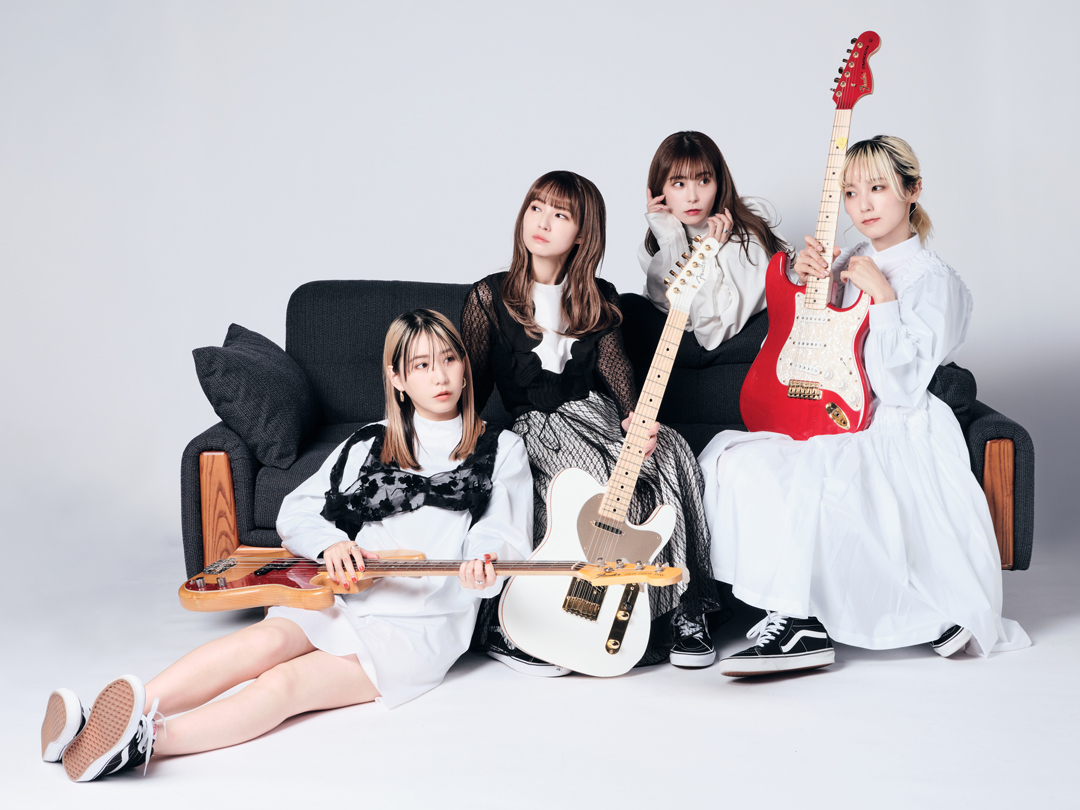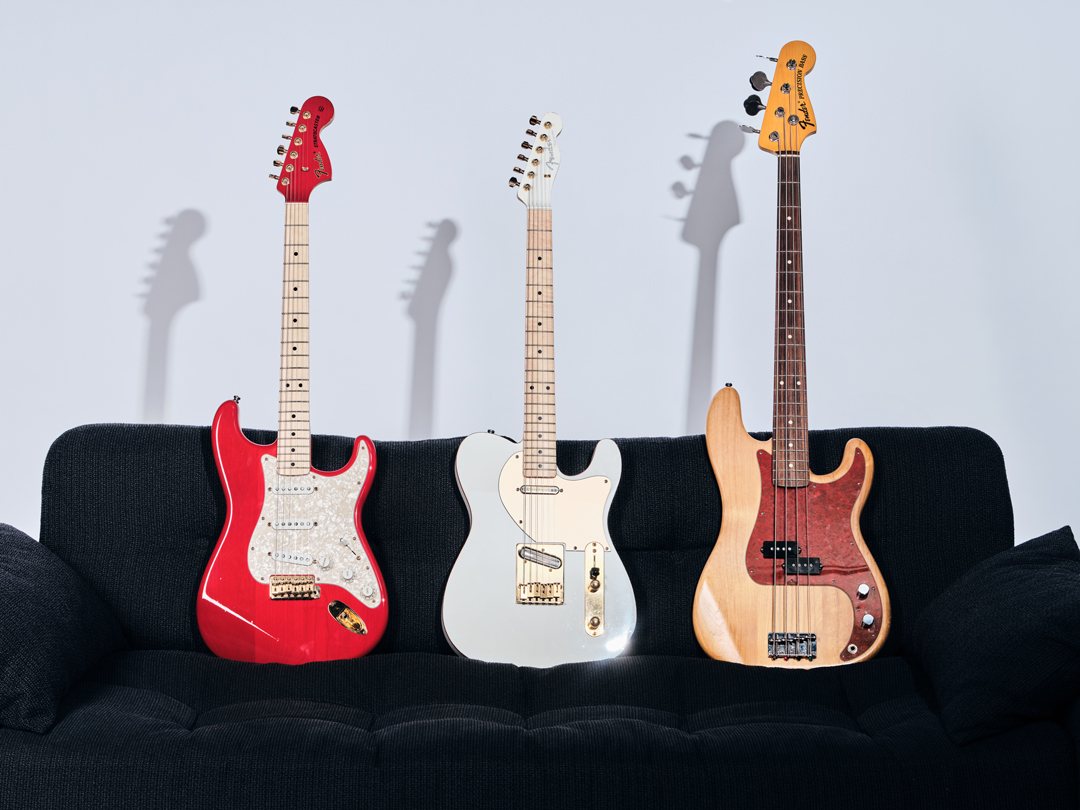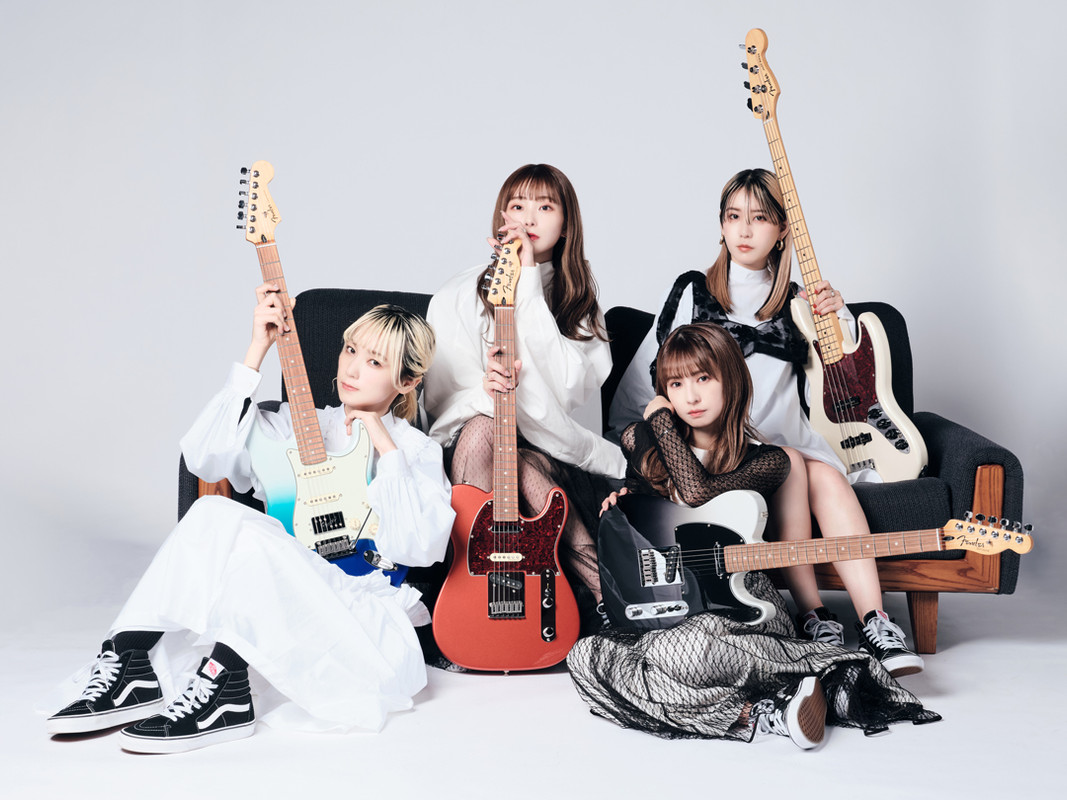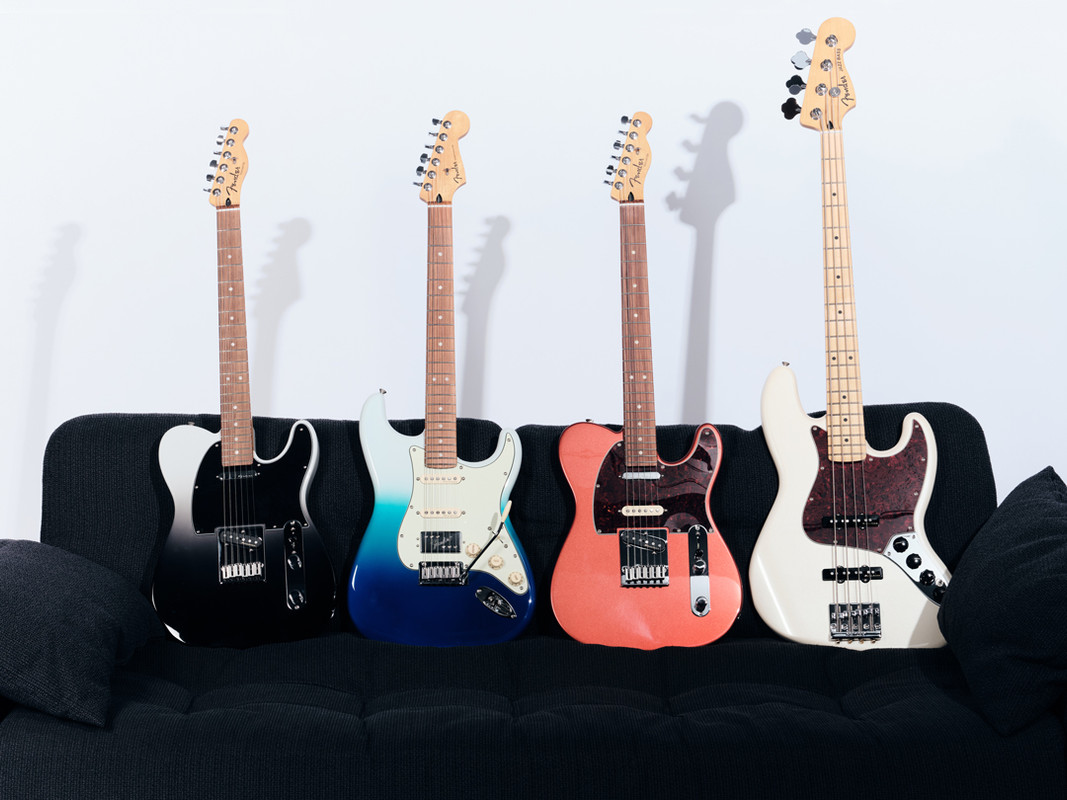Thanks received by this post:
Message reputation : 100% (2 votes)
Fender Cover Artist | SCANDAL, Part 1"Fender produces a standard tone. That's why it's versatile."
SCANDAL, who released their 10th album MIRROR on 1/26, makes their appearance on FenderNews's Cover Artist feature. In part 1 of their interview, the ladies, who celebrated their milestone 15th anniversary last August, look back on SCANDAL's journey so far, including the reason why they started playing instruments. It seems that they have become more familiar with their signature guitars and bass made four years ago, along with a change in musicality."Perhaps the secret to keeping things going for 15 years is to think that we can keep going further"
──It's well known that you started playing instruments at the recommendation of teachers at the dance and vocal training schol that you attended before the band formed, but what did you think when you were first recommended to play instruments?
TOMOMI: We didn't really put up a fight. Since whatever the teachers said was absolute, you had to answer yes when asked if you wanted to try something out (laughs). We were attending the school because we liked music to begin with, so we didn't think that playing instruments was so out of the question.
──I see. You weren't unsure.
HARUNA: Rather, we were really excited that they sensed potential in us.
RINA: I had only been part of the school for about a week. So when they asked me if I'd like to try out the drums, I was like, "What!?" But because my dream was to become someone who performs on stage, I was super greedy and was like, "If given a chance, I'll do whatever it is!" Although I didn't know anything about the drums, I did become able to play them.
──Were you guys familiar back then with music played by bands?
MAMI: We listened more to dance music than bands because we studied dance.
TOMOMI: We were taking lessons where we'd use so-called divas like Beyonce and Christina Aguilera as examples. However, we were high school students at the time when bands like BUMP OF CHICKEN and RADWIMPS were popular, and those in the light music club were copying songs from bands like them. So, it's not like it was completely foreign to us; it was something that we had heard before. We just thought it was cool music instead of thinking about it in terms of sound.
MAMI: I started listening to it in a "This is what bands sound like" way after starting our own band.
──Did you play relatively well from the beginning?
All: No, not at all (laughs).
TOMOMI: This was a dance and vocal training school after all, so we didn't have a teacher to teach us about instruments.
──What!?
TOMOMI: That's why we had no choice but to learn on our own. And what's more, because none of us knew anything about bands, first we rented live DVDs and watched them while starting to practice for performances (laughs). It felt like we started from the "outside," like jumping with an instrument or doing a certain kind of pose during a live performance. There was a sort of school recital scheduled one week after the band formed, and they told us, "You can be the opening act if you learn how to play one song." That's why we practiced Sadistic Mika Band's "Time Machine ni Onegai" as hard as we could.
──I'm sure there are many people who started playing an instrument but then felt frustrated. Why do you think you guys were able to keep going?
TOMOMI: I think we just thought too little about it.
──Thought too little about it?
TOMOMI: Since we were only surrounded by people who danced, at first we didn't think that we couldn't do it (laughs). We didn't get frustrated because we thought about how we were "put together." Maybe we would have felt down if there had been skilled people our age around us [who played instruments]. But when we think about it now, we just feel that we had fun because we all had incredibly strong hearts.
HARUNA: I think it was good that we always had a small goal to work towards. That was also the case when being told that we could perform on stage one week after forming if we were able to learn one song. That kind of goal has always been in front of us, and I think it's because we've accumulated the ability to accomplish the task at hand somehow.
──You've cleared your goals one by one, then.
HARUNA: Yes, it really has been one by one. Also, I think it's a big thing that the four of us started off together.
──One might have given up if they were doing this on their own, but because the other three members are doing their best, you need to do your best as well.
MAMI: In that sense, our environment may have been one where you wouldn't be able to be frustrated. As long as you answered "Yes" to the question of "Why don't you try it?", you had to follow it through. We're all responsible types.
──I'm sure you all worked hard enough to bleed. I mean, when you first play an instrument, doesn't blood seep out of your fingers when you press down on the strings (laughs)?
MAMI: Did anyone bleed (laughs)?
TOMOMI: I did back then (laughs).
HARUNA: We laughed at the fact that our fingertips hardened and the skin turned white. We were like, "It's like rice" (laughs).
TOMOMI: We did say that (laughs).
HARUNA: We were very optimistic and had guts. I think that we learned at that school was the importance of continuing to do something and having the guts to accomplish that. I think the fact that we formed at a school like that is one of the reasons why we've lasted so long.
──SCANDAL has stayed active with the same original members for the past 15-and-a-half years since then, but have you made efforts to keep going?
HARUNA: We've had a lot of fun, we've had a lot of troubles—I think we've lived turbulent lives.
TOMOMI: We haven't done anything special in order to keep going. I think the teachers who chose the four of us are amazing (laughs). People often say we have a "miraculous balance," and that's something we think as well.
MAMI: I think a big reason for that is that we didn't start from being high school classmates, childhood friends, or even just friends. From the beginning I think we unknowingly cared for each other. We don't think things like we need to care; it's such a natural thing that we've kept effortlessly going these past 15 years. From the beginning it's like we've been considerate, or can read the situation, or perhaps have good intuition. We're like a collection of people with high capabilities.
HARUNA: Each of us can simply enjoy the opinions and ideas of the others. We of course have our own opinions, but even when someone comes out with a completely different opinion, we just go, "I see." Maybe adopting that as a part of yourself has been the secret for us to keeping things going.
RINA: We celebrated our milestone 15th anniversary last year, and lately we've been talking about right now is the best time for us—we can do what we want do, the band is how the four of us want it to be. We like ourselves like this. But every time that happens, I think, "We can keep going." We feel that things are going to get even better from here on out. We've never thought that we can't go further. Perhaps the secret to keeping things going for 15 years is to think that we can keep going further while always sensing the potential in ourselves."I had a longing for my first guitar to be a Fender"
──During those 15-and-a-half years you also came across Fender.
MAMI: We did. When I started playing the guitar, what I pictured a guitar to be was in the shape of a Stratocaster. So, when I was told to try out the guitar and went to an instrument store, I looked for a guitar that was shaped like a Stratocaster. The first thing I bought was a so-called beginner's set, not a Fender guitar. After that, when I decided to buy a proper guitar and went to an instrument store, I told them I wanted a guitar in the shape of a Strat. Fender was recommended to me.
HARUNA: The first guitar I bought was also not a Fender, but after we started our activities as an indie band, the teacher who recommended me to try an instrument lent me a Fender Stratocaster. What I pictured a guitar to be was also a Strat, so I used that Strat for a while. It was around the time of our major debut that I thought about buying a proper guitar. I saw a Telecaster then and thought, "Oh, that's shaped differently" (laughs). Strats make me think of lead guitarists, and because I thought of how I'm both a guitarist and a vocalist, I decided to go with a different model from a Strat, which was a Tele. After that, I've been using nothing but Teles.
TOMOMI: The first thing I bought was also a beginner's set. I used it even after starting our street performances. It was then that one of the teachers told me I could borrow a Fender Jazz Bass. I went to return it when we were moving to Tokyo, and they told me, "That's yours already." That's how I got my first Fender.
──RINA, you previously purchased a white Telecaster. Why did you choose that one?
RINA: I had a longing for my first guitar to be a Fender. I got to pick one out here (the Fender showroom). Among the several that had been prepared, the design that I liked was the white Telecaster with a little bit of wood grain visible. It was love at first sight.
──Since then you've been using Fender guitars/basses most of the time. What makes Fender so appealing to you?
MAMI: Fender produces a standard tone. That's why it's versatile—or rather, I of course like their original sounds, but because we have a lot of unique songs with which we use effects, Fender guitars can handle anything during such times. They can handle any song, they're great for playing live, and they're always on the list of guitars I want to use when recording.
HARUNA: That's right. I think they're very versatile. They can handle any song. We've had changes in sound over the last 15 years, but we've continued to use Fender all this time. That's because they've responded well to those changes, and it's really easy to make sounds. It's so great that it's able to produce any tone. Also, they're easy to match with our stage outfits.
TOMOMI: In that sense, there's a sense of security. It's the main pillar of SCANDAL's sound. We've been walking alongside Fender all this time.
──It seems that the signature models of HARUNA, MAMI, and TOMOMI that were released in December 2017 were made with the idea that they could be used for a long time. How has it been using them for the past four years?
MAMI: My signature model (MAMI STRATOCASTER) has basically been my main guitar these days, and I used it quite often when we were recording our album MIRROR. I'll probably use it on our upcoming tour the most. That's how it's become my standard now. Our musicality has changed little by little over these past four years, but about 4-5 years ago I didn't have many opportunities to use the so-called Stratocaster single-coil sound. However, as I got older and became more fussy about tempo and timbre, the number of songs where I play single notes, including arpeggios, has grown, and I started to play a more active role at that time. Now, I'm basically the lead [when it comes to writing music]. I say I'm more "mature" (laughs), but as a woman in her thirties, the songs and timbres have changed and fit just right.
──TOMOMI, did you make any new discoveries while continuing to use your signature instrument?
TOMOMI: I think it can be used for a lifetime, but it perfectly fits my mood right now. I used it a lot during the recording of MIRROR. I feel that the number of songs on which I use signature bass will grow in the future, and I feel that I've gotten closer to my instrument (laughs).
──HARUNA, your HARUNA TELECASTER always sounds so powerful live.
HARUNA: That's right. I really like how it's powerful and properly produces a rich sound. I can go without changing out guitars at all. Our songs are very varied, but I think this truly is a guitar that I can use for a lifetime because it can produce all sorts of sounds by using effects pedals. Reasons why I switch out guitars might be because it'll look better visually, or because we're playing an old song and I want to remember what I felt when we had made it. However, in terms in timbre, even if we have a setlist that's 20 songs long, I'll go almost the entire set without changing out my guitar.
























